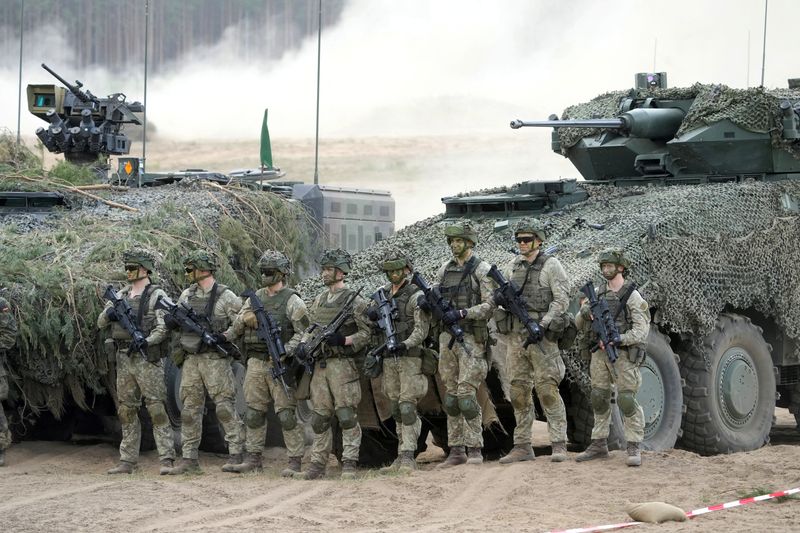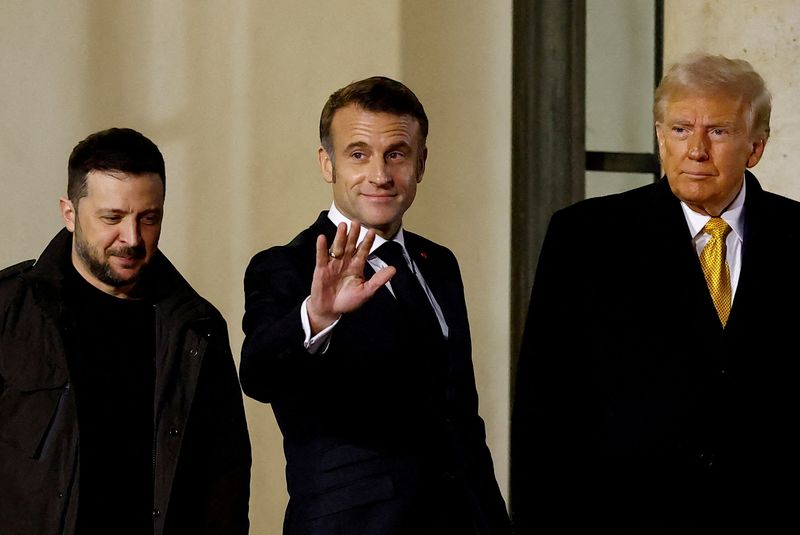By John Irish
PARIS (Reuters) - European nations are discussing sending troops to Ukraine in the event of a ceasefire or peace deal, as U.S. President-elect Donald Trump has made clear he will not put American boots on the ground to guarantee security, officials and diplomats say.
The talks, driven by French President Emmanuel Macron, are at an early stage, but they have already revealed splits over such a mission's possible aims and mandate - and even the wisdom of broaching the issue now.
With Kyiv on the back foot in the war, European leaders want to avoid giving Russian President Vladimir Putin the impression they believe the time has come for talks and that he will get to keep his battlefield gains. They insist they are focused on boosting military and economic aid for Ukraine and see no sign Putin is ready to negotiate.
Yet behind the scenes, some officials are considering how European nations might provide security guarantees for Ukraine, including through a force of tens of thousands of soldiers on Ukrainian soil.
Such a force would raise the risk of a direct confrontation with Russia and stretch European militaries, whose arms stocks have been depleted by donations to Ukraine and who are used to relying heavily on U.S. support for major missions.
But Trump ruled out U.S. troops playing a part in enforcing a ceasefire and insisted Europeans would need to play this role alone in talks with Macron and Ukrainian President Volodymyr Zelenskiy in Paris on Dec. 7, according to two sources.
That could mean Europeans deploying to Ukraine, whether Kyiv gets a security guarantee through joining NATO - as it hopes - or via bilateral assurances.
"Even if there were a NATO security guarantee, where would the impetus on the ground come from? It would be European so our army chiefs are already preparing plans for European leaders to consider in the future," a senior European official said.
Big European nations such as France, Germany, Italy, Poland and Britain could form the bulk of the force, officials say.
BLOWBACK FOR MACRON
Macron has faced blowback for pushing the issue, given the political sensitivity of sending troops on such a mission.
After talks with Macron last week, Polish Prime Minister Donald Tusk declared Warsaw had no plans to join such a force.
German Defence Minister Boris Pistorius said on Monday Berlin would likely play a role in securing a ceasefire but it was far too early to say what kind of force would be needed.
Zelenskiy has said the issue could be raised when NATO chief Mark Rutte hosts the Ukrainian president and other European leaders in Brussels on Wednesday evening.
But Rutte said last week he had urged colleagues in NATO and Ukraine "to be somewhat more muted" in discussing future scenarios.
"At this moment, if you're discussing this all out in the open, why would Putin get to the table, because he's getting what he wants," Rutte said.
Analysts said the debate so far revealed confusion over whether a future European mission would undertake a traditional peacekeeping role, such as monitoring a ceasefire line, or provide a robust deterrent against any further Russian attack.
Italian officials have spoken of peacekeeping, while French and Ukrainian officials have focused on deterrence.
SIZE ESTIMATES
A deterrence force could be formed by a coalition of some five to eight nations, a Ukrainian official privy to some of the discussions said.
Analysts and officials have given varying estimates of the size of such a force, stressing much would depend on its precise mission. Some analysts have suggested around 40,000 troops might be feasible.
Under a rotation scheme that would also have units preparing to deploy and reconstituting after a deployment, some 100,000 troops could be involved in the mission at any one time, said Franz-Stefan Gady, an Austrian former military planner now at the International Institute for Strategic Studies.
"It's going to severely stretch European land forces, for sure," he said.
A European security official, speaking on condition of anonymity, also said as many as 100,000 troops could be needed.
Gady said such a force could be generated if some European nations cut back on other missions, such as Balkan peacekeeping.
Europe, the U.S. and other partners deployed some 60,000 troops to Bosnia and 50,000 to Kosovo in the 1990s, but those missions are much smaller now.
Also under debate is the composition of any international force - as its mix of nations would have to be acceptable to both sides - and its mandate.
Italian Defence Minister Guido Crosetto said it would need to be under the auspices of the United Nations. But other officials say that would give Russia, a permanent member of the U.N. Security Council, too much influence.
The Europeans would also likely have to persuade the United States to be involved in some way, at least with intelligence and other operational help, analysts said.

And potential rules of engagement are among the many critical issues that remain unclear.
"What would happen if a European soldier was shot?" asked a French military official.
